Throughout history and around the world, religious rhetoric has often been used to instigate and justify unspeakable horrors. Religious missions like the Crusades or “New World” discoveries have, at times, gone hand-in-hand with imperialism and expanded into colonialism. As a result, there are many nations and peoples that will never view missionaries, Christian or otherwise, as anything other than a cultural affront and an attempt at cultural subversion.
Yet missionaries through the centuries have helped create institutions of comfort, education, and healing—from the inner reaches of the Amazon to Africa’s bushlands to Asia’s bustling metropolises. In addition, helping the least of these, like orphans and widows, has always had particular importance for Christians. Not all missions are humanitarian, but it can be argued that humanitarian aid would be greatly diminished by the absence of missions and missionaries.
For instance, in a May 2012 article for The American Political Science Review titled “The Missionary Roots of Liberal Democracy,” sociologist Robert Woodberry demonstrates that “conversionary Protestants” helped spread democracy globally. Moreover, they brought with them religious liberty, mass education, mass printing, newspapers, voluntary organizations, and colonial reforms that made stable democracy more likely.
American foreign policy would suffer without the rich legacy of these Christian missionaries. Their extraordinary work that has left a footprint, but it is increasingly being erased, both around the world and even at home. Increasingly, as Christian heritage organizations branch out to appeal not just to the faithful who come every Sunday but the social Christians who are not part of churches but like to take part in Christmas and Easter, missionaries are seen more as religious zealots than as bridge-builders who help our interconnected world—whether by fighting human trafficking, seeking healthy solutions to poverty, being good stewards of our environment, or otherwise. American Christians should, therefore, recognize and promote these missionaries’ efforts that both advance the Kingdom of God and ensure a more peaceful world.
From Missionary Kid to Fulbright Scholar
As the son of Southern Baptist missionaries who have been faithfully serving out their calling for the last four decades in Japan, I have an admittedly biased viewpoint that America’s global leadership and the legacy of Christian missionaries are deeply intertwined. This is not necessarily a normative point of view nor an affirmative statement. There is an active and often vigorous debate within academic and policy circles about missionaries’ previous and ongoing role in the world.
In recent years, advocacy for religious freedom has dominated the intersection between the humanitarian and religious elements of Christian missions and US foreign policy. The fact that many Christians across America who have never owned a passport or left their own communities can experience far-off lands through the missionaries their churches send is a unique legacy that is often underappreciated in official policymaking circles.
My own understanding of the intersection between personal faith and foreign policy came after college when I was privileged enough to serve as a Fulbright Scholar in Turkey. Proselytization is illegal there, and the term “missionary” is associated with ravaging crusaders who converted or killed every Muslim they encountered en route to the Holy Land. Living on campus in one of the most prestigious universities in the capital, Ankara, I came across fellow Southern Baptists who ran small businesses or taught English as a means to carry out their own missional callings. Most of the time they had a deep cultural appreciation and linguistic abilities, but sometimes others seemingly wanted to be martyred for preaching God’s word in the public square.
Given the strength of the US-Turkey alliance, those who were determined to break the law and proselytize in provocative ways were usually dealt with by the US embassy in Ankara, where I served as a local hire and subsequently worked on the Turkey Desk. I was conflicted as a scholar of international relations and a foreign policy practitioner who was also an active Christian, attended church across the street from the embassy in Ankara, and even served as a pastor for a time for the mostly African congregation.
The amazing irony that Asia Minor—where Saint Peter established the first church in Antioch, Saint Paul proselytized from Ephesus and beyond, and Christians have lived for millennia—was being closed off to missionaries was not lost on any of us. Bosphorus University, Turkey’s top university, originally began as Robert College, named after New York Presbyterian and philanthropist Christopher Robert, who funded its building in 1863. Christian missionaries founded or supported many other top educational and health institutions, not just in Turkey but also throughout the Middle East and the rest of the world. Given that Christianity is a religion of the book, Christians often taught people how to read and write, and they brought in printing presses so they could publish religious literature. In some cases, they invented alphabets for previously unwritten languages that led to societal advances that enabled more people to prosper.[i] Such contributions raise the question of missionaries’ history, legacy, and ongoing impact.
Turkey is a particularly emblematic and sad story, not just because the Pastor Andrew Brunson crisis became a flashpoint in US-Turkey relations after the 2016 failed coup attempt, but because the declining trajectory of US-Turkey relations means the already prevalent conspiracy theories and anti-Americanism make any rational discussion of missionary work almost impossible. Turkey today needs more bridge-building, understanding, and study than at almost any other time in its history precisely because the country feels so isolated from the West. When I first experienced this country I love almost two decades ago, I would tell my friends what my parents functionally did—my father was a pastor, and my mother was a children’s teacher—rather than saying they were “missionaries,” given the cultural context. Because of Turkey’s nationalistic and populist mood today, even this description would elicit a negative reaction. This is particularly sad because the groups I connected with most easily at the time were the religious communities that had been isolated for so long under secular Kemalist elitism.
Finding Community, Connection & Meaning Through Religion
My religious upbringing was not just a validator but a useful connection during my time in Turkey. I still vividly remember greeting my religious friends during the holy month of Ramadan with the phrase “Allah Kabul Etsin!” It’s a typical Turkish phrase taken from Arabic meaning “may God accept you.” I was in the old section of Ankara known for its many gecekondos, shanties built “overnight” on steep cliffs. My friend’s family entered the room to begin the Ramadan greetings. Seeing a foreigner, they stopped and simply nodded, until I arose from the floor and stooped to kiss the hands of the oldest member of the family. As I completed this ritual by lightly kissing the cheeks of the grandmother, I once again uttered the traditional Islamic phrase the faithful used during this holy month. With an astonished look, the grandmother broke into a wide smile, grabbed my face, and pulled me to her. As we sat down to break the fast with iftar, I was no longer an outsider. At that moment, I was welcomed into their culture because of my willingness to join them in their traditions. As we talked throughout the evening, they were not only accepting but fascinated by my background. They asked me to share my own faith journey and compare stories from the Bible and the Koran. At 1:00 am we went to the mosque to say prayers where I had no trouble participating, though I prayed a different prayer than their Arabic recitations. We returned to have our pre-dawn morning meal of suhur and ended up staying up all night talking until sunrise, and we fell asleep making our fast the next day particularly easy.
Choosing to fast with my Muslim friends seemed obvious to me. How could you show up to a feast having had full meals that day when everyone else attending had not so much as brushed their teeth for fear they might swallow water? While it seemed like common sense, I was consistently surprised to be the only American or even Christian who had that perspective where I was, and it took me talking to my dad to realize that I was practicing what he had often preached: meeting people where they were. The empathy that you have growing up not just in a far-away land but being placed on a particular type of pedestal as the pastor’s kid is a unique experience and one that has shaped my own appreciation for the world around me.
Throughout the Middle East, the once-proud role of Christians and Christianity’s historic spread from the Holy Land is being erased by an Islamism and nationalism that has little place for their history. The so-called Islamic State is not the only organization that terrorized Christians and non-orthodox Sunnis and began to erase the role of missionaries; extreme secularization and separation of church and state made the use of non-religious humanitarian language much more vogue. Also making life more difficult for missionaries, religious zealots—whether they were extremist Christians, Jews, Islamists, or any other religionists—have throughout history given missionaries a bad name; even the Turkish term “missionary” comes from the crusaders. But missionaries created institutions around the world, including schools and universities, and their impact also includes bridge-building interactions with other societies. This rich legacy is being lost and with it America’s first encounters with this critical part of the world. Rather than driving us further apart, religion should guide and unite us as a community of faith, particularly those of us who share the interconnectedness of our Abrahamic tradition.
After my Fulbright Scholarship in Turkey, I pursued a master’s in international relations at Yale University and found that almost all of the highly culturally and linguistically gifted Americans with whom I interacted had some background with missionaries, whether directly or indirectly. The way in which I and many others in these elite institutions were then recruited to work as diplomats, military or intelligence officers, or policymakers is also part of this history. I remember in my grand strategy class playing out a simulation with my friend, who played the role of the “CIA director,” and we discussed the impact his missionary upbringing had on his own sense of duty and honor, which later led him to serving the agency. A quick survey of America’s most distinguished international officials, whether ambassadors or otherwise, finds a disproportionate correlation between missionary upbringing and service to country that far outstrips our diplomatic or military brethren who grew up overseas like us. Anecdotally, whenever I mention that I’m a missionary kid, I hear a new story wherever I go or serve. Yet few studies address the subject, and there seems to be a reticence even among missionary kids, which I can’t fully explain, to discuss this trend.
Having served as a missionary kid counselor after college, I now fully appreciate how lucky I am to have grown up the way I did. Unlike diplomatic or military kids who often benefited from their proximity to American power, missionary kids often, even literally, run away from America and want nothing to do with their homeland, or pretend they and their parents never had another adopted homeland. I was born into international affairs, and while I did not pursue my parents’ particular profession, I see my own calling as being every bit as important and as informed. Serving as a bridge builder for Americans trying to understand the world and vice-versa is a particularly important role that few in the foreign policy community choose to follow precisely because of how difficult it is. Particularly in an American polity that is increasingly divided along partisan and religious lines, even on foreign policy, the domestic elements of populism and tribalism make it increasingly difficult to play this constructive role. Yet in my travels around the world, I’m amazed at how often international friends just want to look an American in the eyes and get an explanation for their particular policy questions and feel heard. Similarly, rather than hiding faith, I often find that the deepest connections and conversations come from sharing it. Whether in America or overseas, I personally believe it’s important to listen and meet people where they are first so that any subsequent engagement on issues of faith flows naturally rather than by forcing my own beliefs upon anyone.
Building Personal Bridges
Misconceptions about missionaries that prevail in the Middle East—like how in Turkey they’re viewed as ruthless crusaders eager to convert all Muslims at the tip of a sword—have persisted for over a millennium and may always exist given the region’s tortured history. However, developing misconceptions in America today about what missionaries like my parents do on a day-to-day basis and the secularization of this tradition are troubling, especially given the dwindling numbers of missionaries. As outlined, I have no interest in defending zealots in my own faith or any other, but throwing the proverbial baby out with the bathwater is also not advisable. My own experience teaches me that missions is a microcosm of international relations, and an effective missionary’s calling of personal engagement still has an important place in American foreign policy and may even offer important lessons to our most important academics, diplomats, and leaders.
People of different nations engage each other, carrying their
misconceptions, fears, and politics with them, yet
my own life demonstrates the value of personal engagement and travel because
they disabuse people of prejudice and are an often unseen positive side effect
of missions. Missions can help produce better diplomats and more human-centered
international relations that takes theories to the individual level while introducing
children to diverse cultures and minority viewpoints that others may overlook.
Especially in the political moment we find ourselves in as a nation, creating
empathy and bridges between all of God’s children has never felt like a more
important calling for all faithful believers.
[i] For more see Andrew Spencer, “How Christian Missionaries Changed the World for the Better,” Institute for Faith, Work, and Economics, July 14, 2017, tifwe.org.
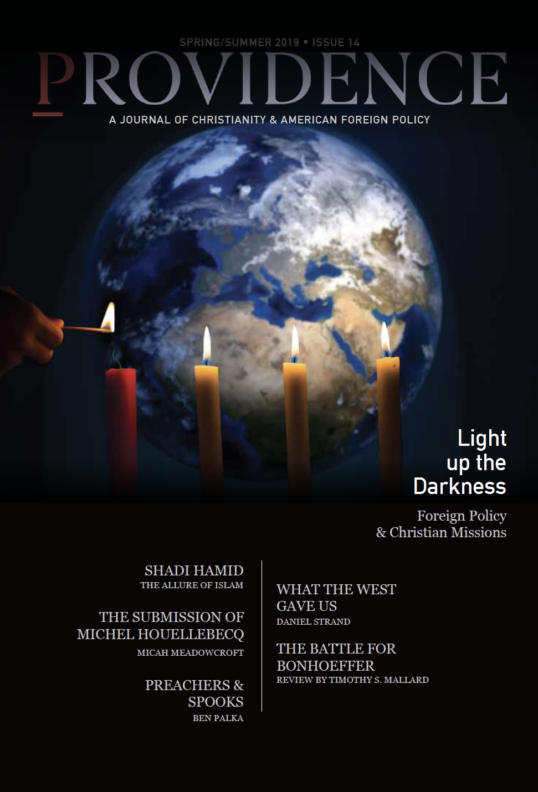
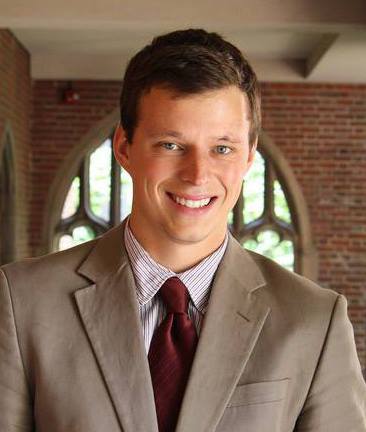
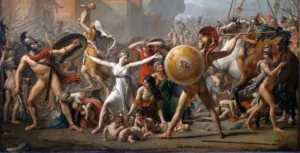


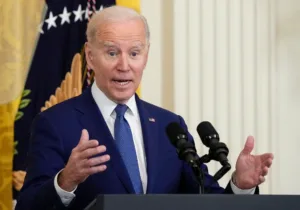
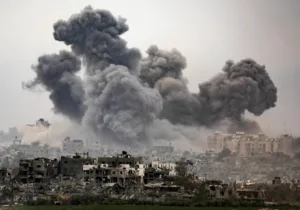

 Live in the DC area? Sign-up for Providence's in-person events list!
Live in the DC area? Sign-up for Providence's in-person events list!